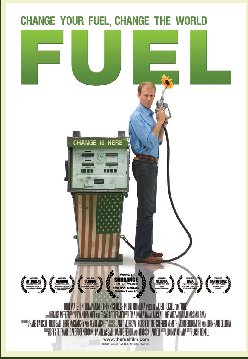Louisiana plays a big role in the movie. Partly it's because the state refines more oil into distillates like gasoline than any other, but also because the health consequences of this are routinely covered up by the oil industry and their friends in the Government. Josh found out about it from personal experience. Things like his mothers seven miscarriages and the cancer clusters around them. Then the movie shows the problems are the same or worse in the other places where we get our oil. Nigeria, Bolivia, Mexico, Russia, and Indonesia all have similar health problems.
 Biodiesel is the answer Josh found on a trip through Germany. He came back sold on it. To popularize the concept he went coast to coast in a biodiesel powered van with sunflowers all over it. It's hard not to share the excitement as people get turned on to the concept of used fryer grease powering many things. In fact, the movie opened my eyes a bit on how many ways our system is powered by diesel engines. Trains, ships, construction equipment, factories, tractors and many other things all use diesel engines. All of them can be run on current crops instead of fossil fuels, if the stuff is there.
Biodiesel is the answer Josh found on a trip through Germany. He came back sold on it. To popularize the concept he went coast to coast in a biodiesel powered van with sunflowers all over it. It's hard not to share the excitement as people get turned on to the concept of used fryer grease powering many things. In fact, the movie opened my eyes a bit on how many ways our system is powered by diesel engines. Trains, ships, construction equipment, factories, tractors and many other things all use diesel engines. All of them can be run on current crops instead of fossil fuels, if the stuff is there.Then the movie traces the harsh lessons of the last few Bush years. It turns out that corn ethanol was rightly dismissed as a fuel that took as much fuel to make as you got from the crop, but the same isn't true for biodiesel. You get three times as much biodiesel fuel energy from a crop of soy beans as you put into raising it. Not only that, but there are many ways to get biodiesel from crops that humans can't eat. He showed that algae farms can be added to sewer treatment plants and power plants, and then the resulting crops can be economically converted to biodiesel.
The last part of the movie is an overview of what our future energy supply is probably going to have to look like. Solar, wind, and hydro power are going to have to be there, along with mass transit, smaller distances, and biodiesel. For more details please see thefuelfilm.com.
After the film was shown we had a brief Q&A with the director and a panel of people in the movie.
One woman introduced herself as a rain forest activist and said that she was very opposed to expanding cropland to grow palms for biodiesel. The director agreed, and said in an earlier version of the movie they had an interview with somebody that explained that issue, but trying to cut it down to the point where it fit made it too didactic and people didn't get it. Instead there was a brief mention that expanding crop acreage was bad, and some discussion of biodiesel crops that didn't compete for farmland. It was one of the many victims of the need to get it out at a running length of 111 minutes or less.
Another woman said plug in hybrids are part of the solution.
Somebody said that car companies are currently planning diesel engines that don't work so well on biodiesel. The director agreed that public pressure needs to be brought to bear against that.
Instead of asking a question, I said I was going to tell a lot of people they should see this movie. Reading this page, you are hearing that now. Click below if you want more information.
